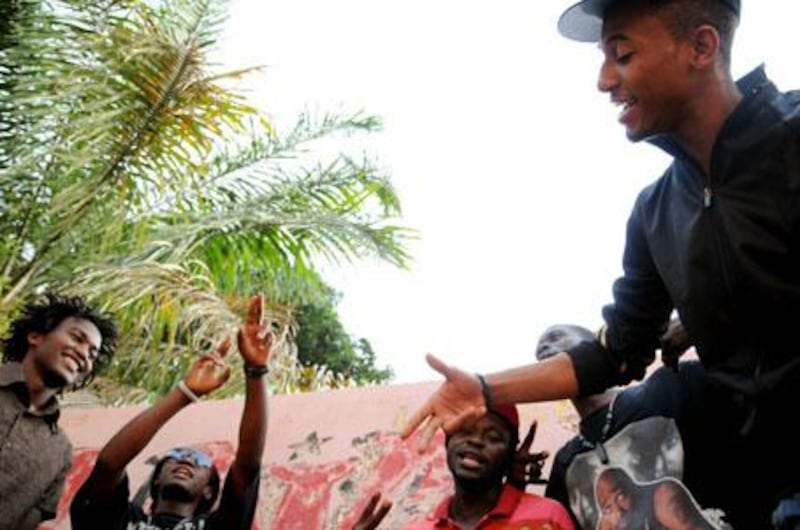BISSAU, GUINEA BISSAU // The hip-hop artist Absil leans back in his chair, smooths his dreadlocks and adjusts his oversized sunglasses. The young rapper is one of the voices of Big Up GB, an extraordinary hip-hop collective born just as the political turmoil in the West African country was reaching its peak. "In 2007, some friends released one of the first pieces of revolutionary hip-hop," he said. "It was called Things are not Alright. It referred to the state of society and government. It was a call for help."
Two years on the political climate is, if anything, harsher. In the past four months Guinea Bissau, one of Africa's smallest countries, has convulsed under the weight of three political assassinations. The chief of the armed forces was shot dead in March, closely followed by the murder of the long-time president Joao Bernardo Vieira. Baciro Dabo, who planned to run in the presidential election that was held on Sunday, was killed in the first week of June.
As Absil talks, in a soft Creole lilt, a cloud of smoke drifts over the fence, and the smell of burning rubbish permeates the air, causing a flock of brightly coloured birds to flee from a nearby palm tree. "The system is worse, it's even stinkier now," he said. Born among the ashes of a burning state, Big Up GB began as a mechanism for intelligent backchat when democracy and political responsibility had failed. The country is now awaiting a date to be announced for a second round in the presidential elections.
Though Sunday's ballot was deemed "free and fair" by the European Union, few expect whoever is finally elected to solve Guinea Bissau's problems, among them chronic corruption and drug trafficking. Hip-hop, however, is numbing the pain. "Music may not be powerful enough to change our society, but it will be part of that change," Absil said. Though artists like Absil have been producing revolutionary rap for years, Big Up GB has amplified their voices. The collective began when Brian King and Shivani Ahlowalia, two Americans with a love for West African music, moved the recording studio of their boutique music label Cobiana Records from the United States to Bissau city.
Mr King said they wanted "to create a platform for hip-hop that goes beyond the borders of Guinea Bissau". To raise funds, they organised a music festival, but a month into the planning Vieira was assassinated. "It was a very tense few days when we were wondering if there was going to be conflict and just what was going to happen," Mr King said. "But we decided we needed to keep going and that the unity we'd been reinforcing between all these different hip-hop groups could be part of the message for national unity and national peace and stability."
The festival went ahead, closely followed by the release of a single to coincide with the election. "Honesty has gone away, peace is played around like football ? Guinea Bissau's democracy pushed out, do you hear me?" the rappers chant in Creole, a raw fusion of Portuguese and West African languages. Mr King said music was a powerful force for change in West Africa. "Some of my musical heroes are from Guinea Bissau, in terms of showing what communication can do to change society."
The most celebrated Bissau-Guinean group is Super Mama Djombo, a collaborative that rose to fame as the country moved towards independence in the early 1970s. Musicians were voted in and out of the group like members of parliament. They included the gumbé pioneer Zé Carlos, who criticised the government and later died in Havana under suspicious circumstances. Another artist, Justino Delgado, fused the calypso notes of gumbé with popular music. He was arrested for criticising the late president Vieira.
Bissau's "Big Up" boys, most of whom are in their early 20s, know they are taking a risk by recording politically charged tracks. One member was arrested by the previous government, but rapper NB Show, a member of the collective, said that only gives them more reason to sing. "Of all the songs I've written, the most important one is called In the Name of the Law," he said. "People can get away with anything they want here."
Absil said he would rather sing about love than politics. He was "horribly upset" when the latest wave of political killings hit. "If you look at all the news that goes out about Guinea Bissau - the president killed, the other political killings - outside of the country it's easy to form a very negative image of it. "The objective of the compilation is to show another image of Guinea Bissau and show that there are human beings there that are thinking about unity and progress. It's just a nucleus of people that aren't thinking right."
But Mr King said he sometimes loses hope. "It's been a pretty unpleasant 45 years of national history. Music is one of the primary vehicles for expression of a national identity and I wonder at what point it stops being a counter-narrative. So sometimes I lose hope but, on the other hand, I think we can still be surprised by what comes out of music." As Bissau Guineans await the runoff ballot, they are wondering who their next leader will be and whether he will do a better job than the last. No president has completed a term in office since 1994; crises, scandals and murders have always interrupted. But through it all there has been a constant soundtrack - the sweet sounds of gumbé music, the rhythm of Portuguese-influenced folk songs and now the energy of creative collectives such as Big Up GB.
Whatever the result of the election, the hip-hop artists will sing. "We lost capable men in the country, traded them for dictatorship ? we lost everything, but did the beat end?" they chant in their song. @Email:kthomas@thenational.ae





